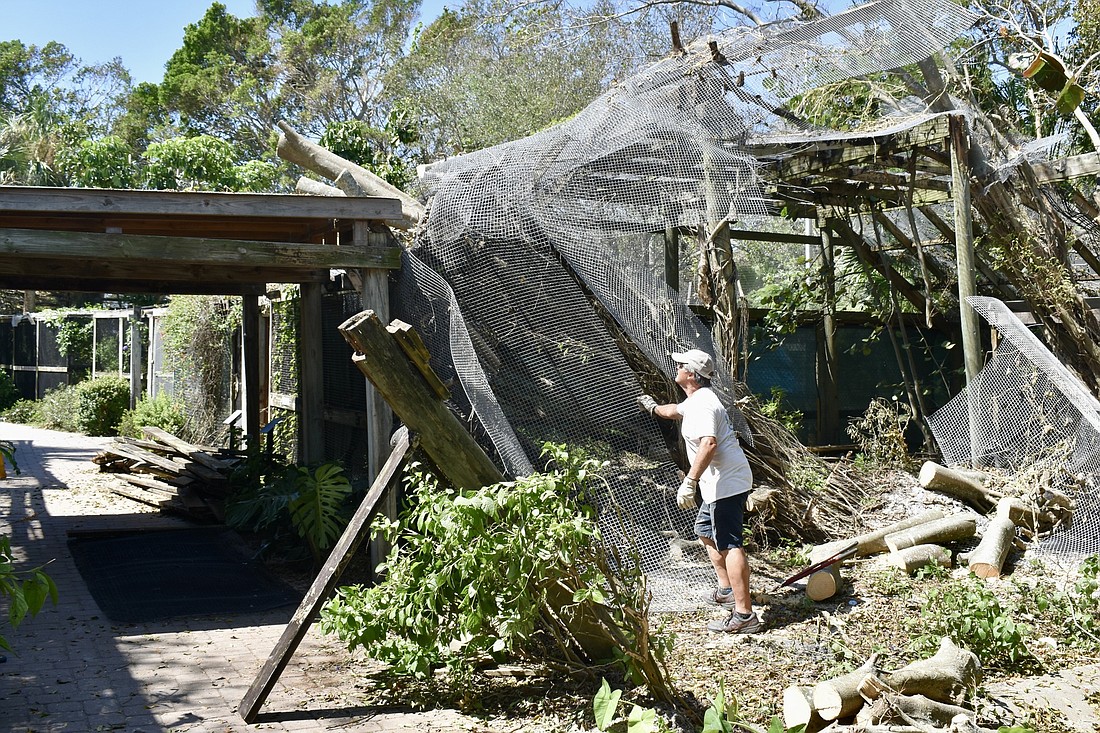- April 25, 2024
-
-
Loading

Loading

It’s hard enough to fully insure a house in Florida.
Try insuring an old bird cage.
Turns out it's next to impossible, and it left Save Our Seabirds with a $125,000 dilemma after Hurricane Ian. High winds toppled three tall ficus trees, which in turn destroyed the two largest bird enclosures. Thankfully, no birds were inside to escape.
The bird rescue and sanctuary located on City Island carries insurance on the main building, which houses the administrative offices and animal hospital. However, SOS cannot secure insurance on the outdoor aviaries. So they’ve been raising money to rebuild on their own.
CEO Aaron Virgin said the aviaries are uninsurable because of their age and how they were built.
“We’ve got stuff that goes back to Pelican Man days, so they were built in ‘88 or ‘89,” he said of the facility's predecessor, founded by Dave Shields.
Most of the birds were moved inside when the barrier islands were ordered to evacuate the Tuesday before Ian was expected to make landfall. Flocks of pelicans stayed in their outdoor enclosures, but 92 parrots and various other species of birds were moved inside the hospital.
Boards on the pelican enclosures were reinforced with extra screws and a heavy dose of precaution. If a storm surge came through, the waterbirds weren’t in danger because they can float.
After two days of sheltering inside, Virgin described the smell when opening the door as simply “the worst,” but every bird housed by SOS made it through Ian safe and sound.
It was their habitats that took the hit. Not only is insurance not covering the damage, the space is so cramped, it makes repairs and the tree removal difficult and costly.
The aviary with the worst damage is surrounded by smaller aviaries. The ficus had grown up through its mesh ceiling. When the tree fell, it pulled the mesh down with it.
The walkways getting to that tree were too narrow to get any kind of equipment through. But because SOS had already been raising money for a capital campaign to replace all the outdated aviaries, they demolished one early to get a lift and skid steer to the downed tree.
The ficus trees had been a hot topic over capital campaign discussions. While the overwhelming preference was to get rid of them, they provided a shade canopy for the birds and were accurately deemed extremely expensive to remove.
“The decision was made. They’re gone,” Virgin said. “We were going to do the other aviaries first, but now everything just changed.”
SOS had hoped to reopen to the public last week, but managers couldn’t get a tree company out to the property until this week. They did what they could between 30 volunteers and a couple of chainsaws to clear the bulk of the debris themselves.
Aside from the ficus trees, the facility held up well. There was no damage to the building.
Three weeks later, they’re $8,620 shy of their $125,000 goal.
The Rebuild SOS fund raised $26,447 through an online campaign, $64,933 through offline donations and a donor who earmarked $25,000 for the capital campaign called to say that money could be used for the rebuild instead.
SOS is pushing to reopen to the public this week. While they don’t charge admission fees, donations are accepted at a kiosk at the front entrance to help cover operational expenses.